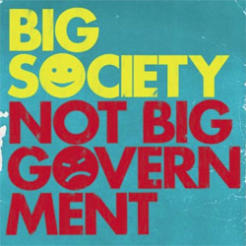Two years in, Kirsty Weakley is still trying to figure out what Big Society is.
Today is the second anniversary of Big Society, which seems like an ideal time to assess its success or failure. There's just one problem - I’m still not sure what it is.
And I don’t think that I’m the only one – is it rhetoric, a vision, a policy or set of policies, or a thinly-veiled excuse to cut funding to public services? And does it still mean the same now as it did in 2010?
Sector figures attended an event at the Guardian’s offices organised by think tank Civil Exchange last week, to discuss the issue. David Robinson, founder of Community Links, delivered a stinging critique of its progress so far, describing it as, “as much use as an ashtray on a motorbike”.
He explained: “Because if it ever meant a thing it doesn’t matter now, not in the disadvantaged communities that I know best.”
Not everyone was quite so disillusioned (although one delegate did ask "if we were attending a wake for Big Society") – but the mood of the room was more, 'what needs to be done?'.
Caroline Slocock, the director of Civil Exchange, which recently published an audit on the Big Society, told attendees that “the voluntary sector has more power than it realises”.
Also presenting was Karl Wilding, head of policy and research at NCVO, who said: “This idea of small state and Big Society, I find problematic”, explaining that the government expenditure on the voluntary sector amounted to 2 per cent of its total expenditure.
Peter Holbrook, chief executive of Social Enterprise UK suggested: “I don’t think we can judge Big Society on the health of civil society organisations. We have to judge Big Society on the health of our society.” Pointing out that “if you’re trying to create a more civil society everyone has to be engaged in that – it’s not just our job”.
Bernard Collier, Navca trustee, said that in his view the problem with Big Society is “the way it is being delivered, there’s a question over is it going to make any difference to community organisations”.
He added that National Citizen Service, one of the government’s flagship Big Society initiatives, was “a huge amount of investment for a tiny amount of volunteering”.
Since 19 June 2010 civilsociety.co.uk has written 238 articles containing the term 'Big Society' – that’s an average of just over two a week. Our own definition says it is: “an attempt to hand back power to the users of public services rather than the providers”. Click here to revisit the stories.
I still don’t know what Big Society is. But I don’t think that matters.
What does matter is that voluntary sector organisations, large and small, have the passion and skills to debate the issues amongst themselves, with government and local authorities. Then to embrace change and go back to their organisations and work on the issues so that society thrives.









